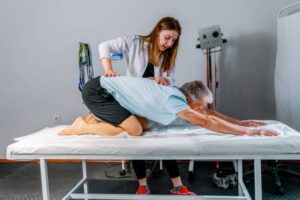ilates exercises are great ways to address back pain because they build core muscle strength, spinal stability and mobility, improve posture and balance as well as providing global muscle activation and body awareness. By retraining movement patterns that may contribute to pain, stiffness and weakness it helps break the cycle.
One way of breaking this cycle is through clinical pilates for backpain Adelaide core stability exercises tailored specifically for everyone by an experienced physiotherapist or osteopath.
Strengthening
 An injured back can lead to some muscles becoming tight and others weak, creating instability within the spine that leads to further pain, injury and weakness.
An injured back can lead to some muscles becoming tight and others weak, creating instability within the spine that leads to further pain, injury and weakness.
Pilates is a movement-based exercise method which emphasises abdominal strength and stability, breathing techniques, and proper technique. Pilates has proven especially helpful for individuals suffering chronic low back pain; the exercises offered through clinical Pilates differ significantly from classes found at gyms because an osteopath or physiotherapist will assess and adapt exercises specifically tailored for an individual’s injuries or needs.
Physiotherapists will assess injured muscles and weak areas. With this information in hand, exercises will then be tailored and modified accordingly in order to be safely executed – known as “directional preference”. This process forms an integral part of Clinical Pilates progression.
The aim of the directional preference process is to enhance the efficiency of movement patterns that an individual employs when not experiencing pain. This improvement can be accomplished through retraining their brain to recognise a new pattern as safe; by doing this, their body will begin using less painful muscle groups more readily thereby decreasing pain and stiffness around an affected area.
Flexibility
While pain reduction and stiffness reduction are both key objectives, it’s also vitally important to increase flexibility of the muscles that support your back. A common weakness among people experiencing back pain is weak and tight transverse abdominus (deep abdominal muscle that supports your spine). When these muscles become too weak, episodes of low back pain may occur because your spine does not receive adequate support when performing daily tasks like unloading groceries from the car or picking up your toddler!
Clinical pilates for backpain Adelaide seeks to address this imbalance by strengthening weak muscles and increasing flexibility – helping make joints and tissues less prone to injury and more resilient against injury.
Contrasting with attending Pilates classes at a gym, a 1:1 assessment with a trained physiotherapist or osteopath allows them to pinpoint your specific needs and weak spots more accurately, creating a program tailored directly towards you and giving the desired results. Your exercises will then become more focused towards you for quicker and lasting improvements; your physiotherapist will assist in learning new movements within your comfort limits so your brain can assess each movement’s safety. As your pain decreases with each progressing phase, they’ll continue to challenge you further through progressed exercise progression – creating more targeted exercises tailored towards your unique requirements than gym classes alone can do.
Posture
Pilates exercises place great emphasis on posture with core stability, balance, strength, control and flexibility as its primary goals. When participating in a one-on-one clinical pilates class with your physiotherapist they will assess any injuries to customise sessions to best address them – using specialist equipment as necessary and offering various exercises designed to treat injuries more effectively.
Lower back pain sufferers often exhibit inefficient movement patterns that aggravate their symptoms. Clinical Pilates can help identify such patterns and retrain your body to perform movements more effectively and without causing pain.
Directional preference exercise prescription, where exercises are prescribed toward areas without discomfort, has been found to significantly increase motor coordination and reduce muscle dysfunction among those suffering from low back pain. Directional preference can also be utilised with diagnostic bullseye exercises which allow clinical pilates for backpain Adelaide to determine if all lumbar spine muscles can move freely through their full range of motion without discomfort and determine any movement-based preferences that exist among patients with back issues.
An unstable pelvic floor can result in symptoms such as incontinence, hernias, coccyx pain and difficulty standing up from sitting. Clinical Pilates’ training of pelvic floor muscles is vital in order to avoid these issues from developing further; using core strengthening exercises also ensures good posture and provides support for your lower back, relieving pressure off both spine and joints.
Balance
Back pain impedes our ability to stay balanced, forcing us to lean or sway in one direction when trying to move around. Pilates exercises provide valuable ways of strengthening core muscles that contribute to postural stability, thus improving balance.
When experiencing back pain, certain muscles can tighten while others weaken, creating an imbalance that’s hard to correct with general exercises alone. A physiotherapist or osteopath can assess your movement patterns to identify which ones need strengthening while stretching as well as devise an individualised clinical Pilates program tailored specifically for you based on your individual needs and goals.
